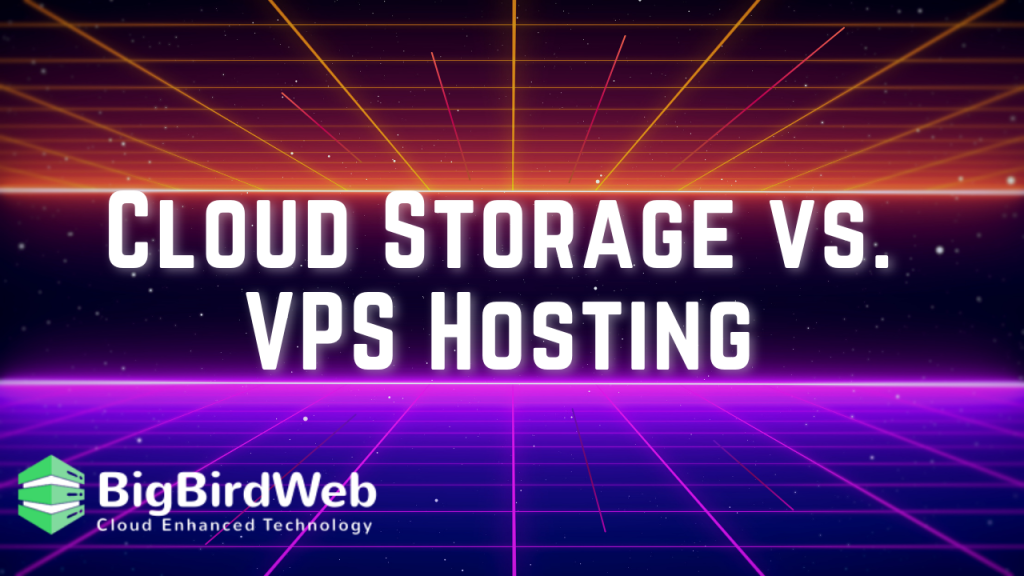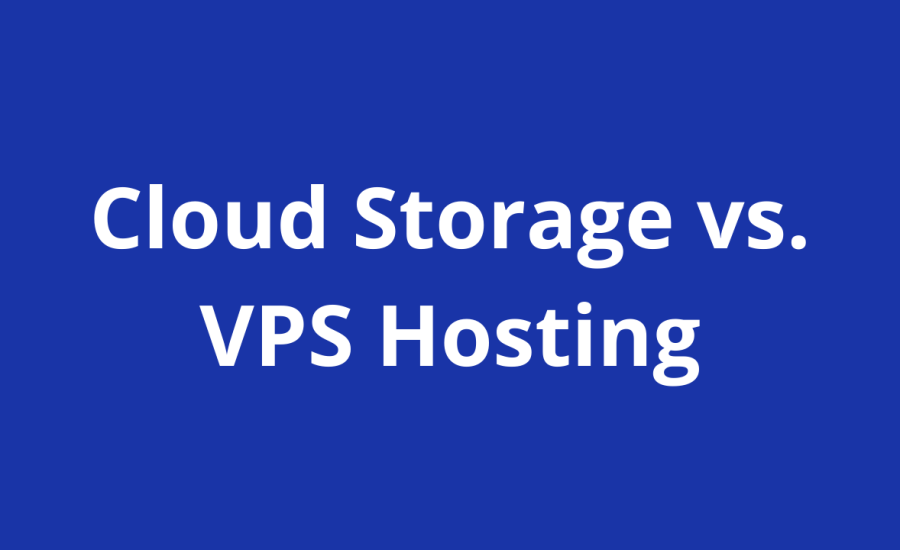In today’s data-driven world, storing and managing information online is crucial for individuals and businesses alike stored on cloud storage. Whether it’s personal photos, business documents, or website files, having a reliable and accessible storage solution is paramount. Two prominent options emerge – cloud storage and Virtual Private Server hosting. While both offer online storage capabilities, they serve distinct purposes. This blog delves into the core differences between storage and VPS hosting to help you select the perfect tool for your digital toolbox.
Table of Contents
Understanding Cloud Storage: A Vast Digital Vault

Imagine a secure, off-site storage facility accessible from anywhere with an internet connection. That’s essentially what cloud storage offers. Cloud storage providers like Dropbox, Google Drive, or Microsoft OneDrive rent out virtual space on their massive servers, allowing you to store and access your files online.
Here are some key benefits of cloud storage:
- Accessibility: Cloud storage allows you to access your files from any device with an internet connection, be it your computer, smartphone, or tablet. This eliminates the need for physical storage devices and ensures your files are always readily available.
- Scalability: Cloud storage offers flexible and scalable storage options. You can easily upgrade or downgrade your storage space as your needs evolve, paying only for the storage you use.
- Security: Reputable cloud storage providers implement robust security measures like encryption and access controls to safeguard your data. Additionally, automatic backups offered by many providers ensure you don’t lose your files due to hardware failures or accidental deletions.
- Collaboration: Cloud facilitates easy collaboration on files. You can share documents, photos, or other files with others, allowing them to view or edit them in real-time, fostering teamwork and improved efficiency.
However, some limitations come with cloud storage:
- Performance: Accessing and manipulating files stored in the cloud might be slower compared to files stored locally on your device, especially with limited internet bandwidth.
- Vendor Lock-In: Switching between cloud storage providers can be cumbersome, especially if you have a large amount of data stored.
- Cost: While many cloud storage providers offer free plans with limited storage space, exceeding these limits incurs monthly subscription fees. For free web hosting refer to the link.
VPS Hosting: A Powerful Virtual Server for Your Online Needs
Think of VPS hosting as a dedicated workspace within a large office building. VPS hosting virtualizes a physical server into multiple virtual servers, each acting like a dedicated server with its own operating system, storage space, and processing power (CPU and RAM). This translates to greater control, security, and performance compared to shared hosting, where multiple websites share resources on a single server.
Here’s what makes VPS hosting a compelling choice:
- Control and Customization: VPS hosting offers a high degree of control over the server environment. You can install the specific software applications your website requires and configure settings to optimize performance for your needs.
- Security: VPS hosting provides a more secure environment compared to shared hosting. Your website has its own allocated resources, minimizing the risk of security breaches or performance issues caused by other websites on the server.
- Scalability: VPS hosting plans are scalable, allowing you to easily upgrade your resources (CPU, RAM, storage) to accommodate website growth in traffic or complexity.
- Performance: Websites hosted on VPS servers experience faster loading times and improved overall performance compared to websites on shared hosting plans.
However, VPS hosting does have its drawbacks:
- Technical Expertise: Managing a VPS server requires some technical knowledge, especially for tasks like server configuration and software installation.
- Cost: VPS hosting plans are typically more expensive than basic cloud storage options.
- Management Responsibilities: With VPS hosting, the responsibility for server management falls on you. If you lack technical expertise, consider managed VPS plans where the provider handles these tasks.
Choosing the Right Solution: It Depends on Your Needs
The ideal solution, cloud storage or VPS hosting, depends on your primary needs:
- For Basic File Storage and Accessibility: If you need a convenient and accessible way to store and share personal files like photos, documents, or music, cloud storage is a perfect choice. Free plans with limited storage might suffice for basic needs, with paid plans offering increased capacity as required.
- For Website Hosting and Management: If you’re building or managing a website, VPS hosting is the more suitable option. It provides the resources and control needed to run your website efficiently, including installing web applications, databases, and customizing server settings for optimal performance.
- For Businesses with Complex Data Needs: Some businesses might require a combination of both solutions. Cloud storage can be used for file sharing and collaboration within the organization, while mission-critical website data and applications can be hosted on a secure VPS server.
Beyond the Basics: Additional Considerations
While the primary purpose separates them, consider these additional factors when making your choice:
- Security Features: Both cloud storage providers and VPS hosting providers offer security measures. Cloud often includes encryption and access controls, while VPS hosting offers dedicated resources and isolation from other websites. Evaluate your specific security requirements and choose the solution that best safeguards your data.
- Backup Options: Regular backups are crucial for data protection. Some cloud providers offer automated backups, while with VPS hosting, you might need to manage backups yourself. Ensure you have a reliable backup strategy in place, regardless of which solution you choose.
- Long-Term Cost Management: While cloud storage might seem cheaper initially, especially with free plans, costs can add up over time as storage requirements increase. VPS hosting might offer a more predictable and cost-effective solution for websites with consistent resource needs.
- Technical Expertise: Consider your technical comfort level. Cloud is generally user-friendly, while VPS hosting requires some technical knowledge or reliance on managed VPS plans.
The Final Verdict: A Symphony of Solutions
Both cloud storage and VPS hosting play vital roles in today’s digital landscape. Cloud storage offers a convenient and accessible way to store and share your files, while VPS hosting empowers you to build and manage robust online presences like websites or applications. Understanding their strengths and limitations allows you to create a harmonious symphony of solutions, perfectly tailored to meet your specific needs.
FAQs
Q: Can I use cloud storage for website hosting?
A: While some cloud storage providers offer basic website hosting features, these are generally not suitable for complex websites. VPS hosting offers dedicated resources and greater control over server settings, making it the preferred choice for robust website hosting.
Q: Is cloud storage more secure than VPS hosting?
A: Security depends on the specific provider and your chosen plan. Both cloud storage and VPS hosting offer strong security measures. Cloud storage often handles automated backups, while VPS hosting requires a separate backup strategy.
Q: Can I use both cloud storage and VPS hosting together?
A: Absolutely! This is a common approach for businesses. Cloud storage can be used for file sharing and collaboration within an organization, while VPS hosting can be used for mission-critical website data and applications that require more control and dedicated resources.
Q: Are there any hybrid solutions combining cloud storage and VPS hosting?
A: Some cloud providers offer solutions that combine cloud storage with virtual server functionality. These can be a good option if you require both functionalities but prefer a simplified management experience.
By carefully considering your storage needs, technical expertise, and budget, you can select the ideal solution or even leverage a combination of cloud storage and VPS hosting to build a secure and efficient digital infrastructure for your personal or business needs. Remember, the perfect solution lies in understanding the strengths of each option and creating a digital toolbox that empowers your online endeavours.
